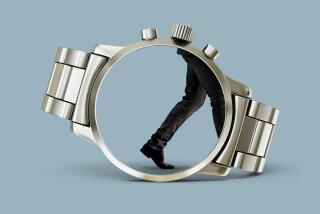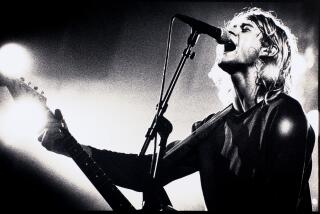Leo Fender, Electric-Guitar Pioneer, Dies in Fullerton
- Share via
FULLERTON — Clarence Leo Fender, the electric-guitar pioneer whose renowed Stratocasters have been played by such rock ‘n’ roll legends as Buddy Holly, Eric Clapton and Jimi Hendrix, died Thursday, apparently of natural causes. He was 81.
Fender was found unconscious in his home on East Dana Place here by his wife, Phyllis, about 10 a.m. and died en route to St. Jude Hospital and Rehabilitation Center, Fullerton police said.
“When his wife went in to help him dress today, she found him unconscious on the family-room floor,” said Orange County coroner’s investigator Cherry Van Stee.
While Fender did not invent the electric guitar, he did revolutionize and perfect it. Fender was called both the Henry Ford and the Thomas Edison of the instrument, and his guitars and amplifiers set the industry standard for excellence.
“Fender was a phenomenon,” said Peter Schuelzky, general manager of the Guitar Center in Hollywood. “He created the guitar (to) which all other manufacturers try to conform. Everyone tried to copy the shape and sound. Nobody has been quite as successful.”
Electric guitars made Fender, a tinkerer and inventor by nature, a millionaire.
In 1954, Fender created the Stratocaster, a revolutionary instrument hailed as a near-perfect fusion of electronics, ergonomics and technology on one side and design and aesthetics on the other. It was quickly dubbed “the Strat.”
“The Stratocaster is like the Rolls-Royce,” said Dick Dale, called “king of the surf guitar” for originating the surf-rock sound in Orange County in the mid- to late 1950s. “It can never be surpassed.”
Although solid-bodied electric guitars had been around since the 1930s, Fender improved the frets, tuning pegs and electric pickup.
Colorful and inexpensive, the Strat broke musical barriers with its variety in tone. Other guitars suddenly seemed clumsy next to the graceful yet outrageous Strats, painted in glitzy reds and yellows and other sparkling colors.
The first Strats sold as cheaply as $75. Now they are rare collectibles that can fetch up to $20,000.
Buddy Holly played a Fender. So did the Beach Boys, Jimi Hendrix, Eric Clapton and Bruce Springsteen.
Besides attracting rock’s first great stars, such as lead guitarist James Burton, who helped propel Ricky Nelson to the top, the Strats also were popular among guitarists on the Lawrence Welk Show.
Artists in other genres found the Strat just as compatible. Even the Three Stooges played Fenders in a movie.
“I guess (the Stratocaster) lent itself well to certain types of music,” John Carruthers, a guitar maker in Los Angeles who used to be a consultant to Fender, told the Associated Press. “A lot of country musicians liked it, and he went out of his way to promote it to them.”
For his work, Fender was inducted into the Country Music Hall of Fame and the Rock Walk of Fame.
But rockers were the ones who made Fender a household name in and out of the music world. When the Rolling Stones were inducted into the Rock and Roll Hall of Fame, Keith Richards took his time at the mike to say, “I’d just like to say thank God for Leo Fender, who makes these instruments for us to play.”
“Fender was definitely a pioneer,” Carruthers said. “It’s still probably the No. 1-selling guitar in the world.”
Dale, who played a key role in the development of Fender amplifiers and guitars, was devastated by the news of Fender’s death.
“I’m not too good,” he said in a telephone interview from his home in Twentynine Palms. “I just heard the news about a very close friend. . . . When I heard tonight about Leo, I got sick. It just freaked me out. All the great ones are going.”
Dale received one of the first Fender amplifiers after his father approached Fender for help after Dale decided that his pawnshop guitar couldn’t produce the booming sounds necessary to please large crowds at the Rendezvous Ballroom in Balboa.
That began a trial-and-error process in which Fender tried to come up with increasingly bigger, more powerful amplifiers that could put out the booming, fat, surf-rock sound that Dale wanted. The end result was the Fender Showman amplifier, which became a standard piece of rock-music equipment.
“We had a rapport, where he gave everything to me to experiment,” said Dale, 53. “He had a saying: ‘If it can withstand Dick Dale, it is fit for consumption on the market.’ He’d call me up at 3 o’clock in the morning and say, ‘Dick, I gotta see you.’ He’d call me every other day to try something new and see if I liked it, because I was his guinea pig. We were just blasting them out.”
Born Aug. 10, 1909, on a small farm in Anaheim, Fender began tinkering with guitars when he became a radio repairman in the late 1940s. His first big success was the Fender Broadcaster, which came out in 1950. He renamed the guitar the Fender Telecaster after a drum-set company put out a kit called the Broadcaster.
The Telecaster was popular. But it still had technical problems. Four years later, Fender came out with the Strat.
When Fender sold his company to CBS Inc. in 1965 for $13 million, the firm was at its peak. At that time, Fender said his company was making guitars at the rate of one every 60 to 75 seconds in a factory that encompassed 27 buildings in Fullerton and Anaheim.
Despite his financial success, Fender never quite retired. Ten years ago, he began working for his newest company, G&L; Musical Products, despite continued bouts of illness.
“He’d been sick for quite some time,” said Van Stee. “He apparently had Parkinson’s (disease) and a couple of strokes.”
His most recent stroke occurred on his birthday last summer. But Fender continued to work.
“He was a man whose brain was always trying to improve things,” Dale said. “He’d stay up all night; he’d never go to sleep. He was always trying to make something better. And he did. He was a man who wouldn’t quit, around the clock.”
Times staff writers Mike Boehm, Anita M. Cal and Matt Lait contributed to this report.
More to Read
The biggest entertainment stories
Get our big stories about Hollywood, film, television, music, arts, culture and more right in your inbox as soon as they publish.
You may occasionally receive promotional content from the Los Angeles Times.










